Progress report for FLW24-012
Project Information
After source reduction, redirecting surplus food to feed people is the highest priority action for preventing and diverting food waste. Among the types of food to be redirected, good-to-eat prepared food is the most valuable because of the value of the raw ingredients as well as the additional labor and other resources involved in the preparation. Despite the high value of prepared food, ReFED data indicates that only 0.75% of surplus prepared food from the food service sector was donated in 2022. Redirecting surplus prepared food as free, take-home family meals provides a valuable benefit to food insecure families, in terms of both the nutritional value of the food and the additional time and money parents and caregivers gain from not having to shop for and prepare a meal.
Funding for the Pete’s Garden SARE Community Foods Project would be used to demonstrate the viability and growth potential of a program to redirect surplus prepared food as free take-home family dinners to food insecure families. Funding will support the creation and distribution of a “playbook” for how organizations in other cities/regions can start their own family meal distribution program by recovering and redirecting surplus prepared food. In completing this project, we will validate ReFED data on the amount of prepared food currently being donated in the Kansas City market and estimate the total amount of surplus prepared food that is good-to-eat and donatable in our market. In completing this project, we will also engage in outreach to inspire and enable similar research and programs in other markets.
Over the course of the 3-year grant we will:
- Develop and implement a replicable methodology for establishing a baseline and sizing the growth opportunity for prepared food recovery in a local market; apply this methodology to the Kansas City market.
- Interview Kansas City food pantries and community kitchens that accept prepared food donations to capture baseline date on poundage and type of food currently recovered.
- Compare the baseline estimate we develop for Kansas City to ReFED state-level data for prepared food waste in Kansas and Missouri.
- Interview Kansas City composters that work with food service businesses to identify businesses that may be composting good-to-eat, donatable food.
- Interview at least 10 food service managers who do not donate to understand their concerns or impediments to prepared food donation.
- Survey at least 100 Kansas City restaurants, caterers, and food service operations to assess current practices regarding surplus food.
- Use interview and survey results to estimate the total amount of wasted prepared food available for donation.
- Develop and implement a replicable plan to establish and scale-up a local program for redirecting surplus prepared food as free, take-home family meals, using Pete’s Garden as a model; develop a “playbook” to disseminate this information to other cities/regions.
- Present the Pete’s Garden meal distribution model at the annual ReFED conference in 2026 and 2027.
- Identify at least 2 other relevant regional or national conferences and present the Pete’s Garden meal distribution model at those conferences.
- Build awareness and buy-in regarding food loss/waste and food recovery within the Kansas City food service sector, resulting in a 2x increase in the amount of surplus prepared food donated to feed people in the Kansas City market, from 200,000 pounds (current baseline estimate) to 400,000 pounds, over the 3-year grant period.
- Incorporate the Pete’s Garden case study into the Kids Feeding Kids curriculum and present to 200 teachers and at least 15,000 FACS and Culinary Arts students over the 3-year grant period.
- Use pre/post student surveys to demonstrate that student awareness of the food waste problem increased because of their participation in Kids Feeding Kids.
Cooperators
- - Technical Advisor
Research
We have developed productive working relationships with leaders at the Greater Kansas City Restaurant Association, the Greater Kansas City Chefs Association, and the Hotel & Lodging Association of Greater Kansas City. We have developed a Google survey to be fielded with members of these three organizations. The purpose of this survey is to determine the extent to which food service professionals and food service businesses are donating their surplus prepared food and to capture leads for potential new food donors. Our goal is to obtain at least 100 completed surveys across the three organizations. After the survey results are tabulated, we will identify at least 10 food service professionals (chefs, dining service managers, etc.) to interview in greater depth about their food donation experience.
Pete's Garden survey for KC food service
- Restaurant
- School/institution
- Donate or Upcycle
The planned survey and subsequent interviews with food service professionals will allow us to better understand the barriers to food donation in the Kansas City area and develop tools to overcome those barriers and increase food donations from the food service sector.
Pete's Garden weights and records every inbound food donation, noting the food donor, date prepared, date frozen (if frozen), and pickup date. The prep date allows us to determine a use-by date that is printed on the meal label. We also record whether the food donated is a protein, starch, vegetable, or "mixed meal". A mixed meal is an item that includes protein plus either a vegetable or a starch, such as lasagna, chicken fried rice, pasta with meatballs, etc.
During this first recording period, October 1, 2024 through March 14, 2025, Pete's Garden recovered and redirected 89,380 pounds of food from a minimum of 16 different food donors. With our Kansas City location, we recover food from food donors in both Kansas and Missouri. Pounds of food recovered, by zip code, is indicated in this table.
Pete's Garden food donations, Oct 1, 2024 - Mar 14,
As we make progress against grant deliverables (survey of food service sector, awareness-building initiatives targeting the food service sector), we expect to steadily increase food donations to Pete's Garden or other Kansas City food recovery organizations.
Pete's Garden packages all recovered food into take-home meal containers. Volunteers portion and package the food, working out of a health-department inspected commercial kitchen. The take home meals are distributed to social service organizations that serve families with children, primarily Head Start programs, after-school programs including Boys & Girls Club, and low-income family housing programs.
During this first recording period, October 1, 2024 through March 14, 2025, Pete's Garden redirected 89,380 pounds of food, enough for approximately 74,400 meals. Meal distribution by zip code is indicated in this table.
Pete's Garden does not collect data on the families who receive our meals. We rely on the social service agenices that are our distribution partners to manage meal distribution. Based on the average number of meals we distribute each week, we estimate that approximately 700 families each week take home a complete Pete's Garden meal, across at least eight different agencies.
Pete's Garden meal distribution, Oct 1 2024 - Mar 14, 2025
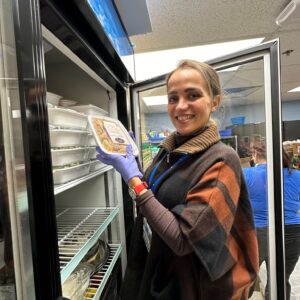
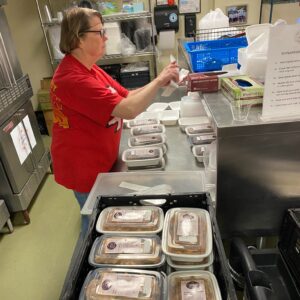
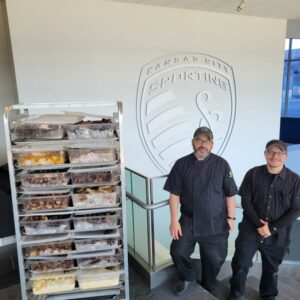
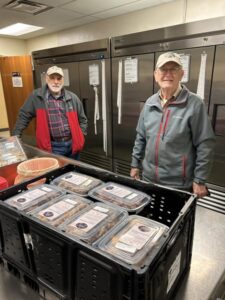
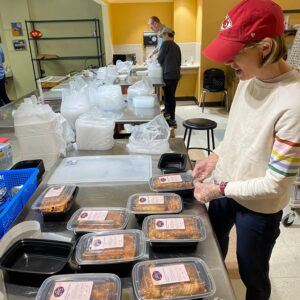
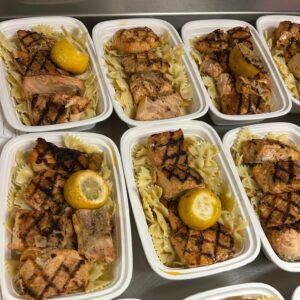
- Meat
- Dairy
- Grains
- Produce
The 89,380 pounds of food recovered by Pete's Garden during this first recording period, October 1, 2024 through March 14, 2025, includes:
Prepared protein (meat) - 40%
Prepared protein (plant protein) - 4%
Starch side dish - 24%
Vegetable side dish - 20%
Mixed meals (meat or plant-based protein with a starch and/or vegetable) - 12%
Photos include typical recovered food:
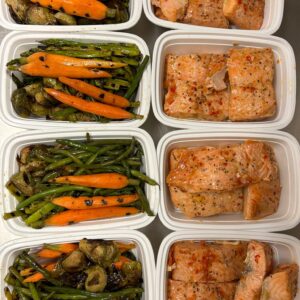
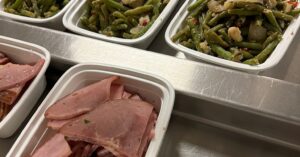
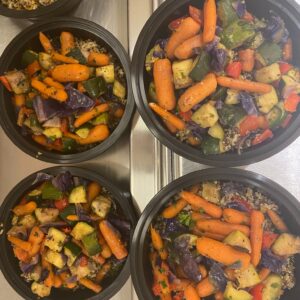
During this first recording period, Oct 1 2024 - March 31, 2025, we have strengthened our relationships with relevant local industry groups:
Greater Kansas City Restaurant Association
Pete's Garden recently joined as an Allied member of the association and our staff attends monthly GKCRA meetings to represent food recovery issues.
Hotel & Lodging Association of Greater Kansas City
Pete's Garden joined as an Allied member of the association. Members will volunteer at Pete's Garden to package meals for the April 9, 2025 HLAKC Cares Day (membership community volunteer day).
Pete's Garden presented at a recent association meeting. Diane Mora, Pete's Garden/Kids Feeding Kids Education Director, has applied to join the Board.
MARC Solid Waste Management District
Pete's Garden is an active member of the SWMD Food Waste Advisory Council and is engaged with the group to plan and implement Food Service Food Waste Prevention training targeted to members of the Kansas City food service profession. The planning work for this training kicked off in March 2025. Implementation is expected to begin in late 2025 and continue into 2026 as Kansas City prepares to host the 2026 World Cup.
9/24 – 12/24: Assess the amount of prepared food that is currently recovered and redirected by Kansas City nonprofits, in addition to Pete’s Garden, to establish a baseline for the pounds of prepared food donated; if this baseline estimate is significantly different from ReFED data, identify the likely reasons for the difference.
Assessing how much prepared food is currently being recovered from the food service sector by Kansas City nonprofits, other than Pete's Garden, has been more challenging than expected for two reasons: 1) many organizations do not accurately or reliably track poundage for donated food and 2) some organizations are hesitant to provide the information for fear that Pete's Garden or some other organization will try to encroach on these donations and donor relationships. We are continuing to gather data from recipient agencies. We expect that our planned survey of the food service sector will also provide data on current donation poundage.
10/24 – 1/25: Interview at least ten (10) local industry professionals (restaurants, caterers, food service operations) who do not donate to understand their concerns or impediments to prepared food donation.
We plan to conduct these interviews after we field a food donation survey among food service professionals and food service businesses so that we can incorporate any learnings from the broader survey into the one-on-one interviews.
2/25 – 6/25: Survey a broad range of potential food donors, at least 100, to assess their willingness to start a food recovery program and the types of food most likely to be available as surplus.
We expect to field this survey in April 2025
10/24 – 5/25: Develop and test new curriculum component for Kids Feeding Kids.
Complete. Teachers participating in Kids Feeding Kids can choose to implment the new food waste lesson for their Spring 2025 KFKids projects.
Kids Feeding Kids Food Waste Lesson Module, with teacher notes
Education
In addition to operating a food recovery program, Pete’s Garden partners with high school Culinary Arts and Family & Consumer Science (FACS) programs to engage students in preparing take-home meals for food insecure families in their communities. This program, Kids Feeding Kids, provides educators with a standards-based food justice and culinary curriculum focused on increasing food access, reducing food insecurity, and raising awareness around the social and environmental impacts of food waste. Educators who participate in Kids Feeding Kids receive lesson plans along with all the ingredients and supplies they need to help their students prepare up to 1,000 meal servings that are distributed free to families.
The core component of Kids Feeding Kids is a lesson about the root causes of food insecurity, with a focus on the disparity between minimum wage rates and actual costs of living for families with children. The goal of the lesson is to destigmitize food insecurity and foster empathy, understanding, and compassion among the students for families who need additional food support. Kids Feeding Kids Food Insecurity Lesson with teacher notes
With funding from this SARE grant, Pete's Garden commissioned a new lesson module teaching students about the social and environmental impact of food waste. KFKids Food Waste Lesson with teacher notes
Teachers choose from multiple "hands-on" activities designed to engage students in addressing food waste in their community by:
- Creating a compelling PSA that informs local chefs and food service managers about the Bill Emerson Food Recovery Act and the Food Donation Improvement Act, emphasizing how these laws protect prepared food donations made in good faith.
-
Identifing and sourcing surplus ingredients from the community and transforming them into nutritious meals to reduce food waste and address food insecurity for area families.
- Identifing and collaborating with one or more local food service entities (including their school cafeteria) to reduce food waste and redistribute surplus food to families in need.
This new lesson module was released for Spring Semester 2025. Future reports will provide feedback from participating teachers/students.
Educational & Outreach Activities
Participation summary:
Pete's Garden has created a new lesson module on Food Waste for our Kids Feeding Kids program. Food Waste Lesson
The new module was released in January 2025. Kids Feeding Kids is being implemented in approximately 35 high schools this semester (Spring 2025).
Teachers may choose to teach the Food Waste module or our core Food Insecurity module or both. Food Insecurity Lesson
Data is being collected on which lessons are taught, how many students participate, and student feedback.
The new Food Waste Lesson was just launched in January 2025. Four teachers have completed their Kids Feeding Kids event for the semester. Howver, results have not yet been reported or recorded.
Project Outcomes
No outcomes to report yet as our Educational Outreach has just started.